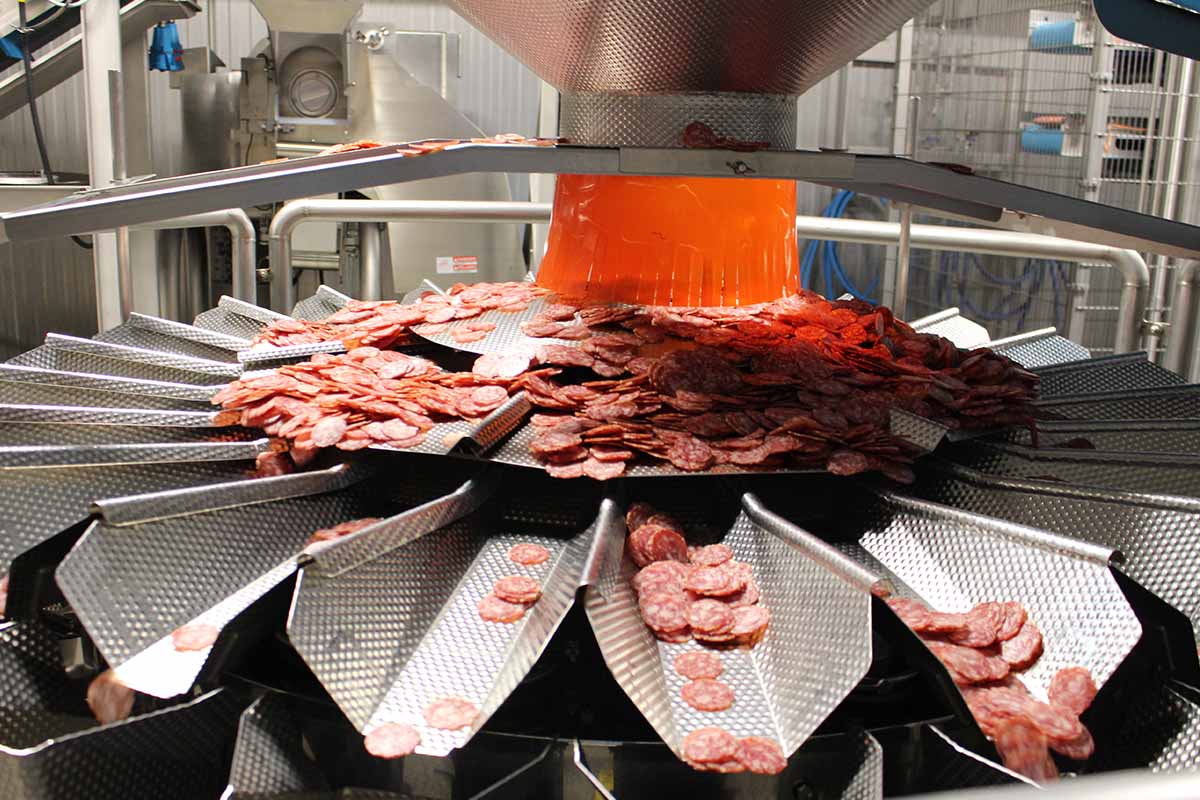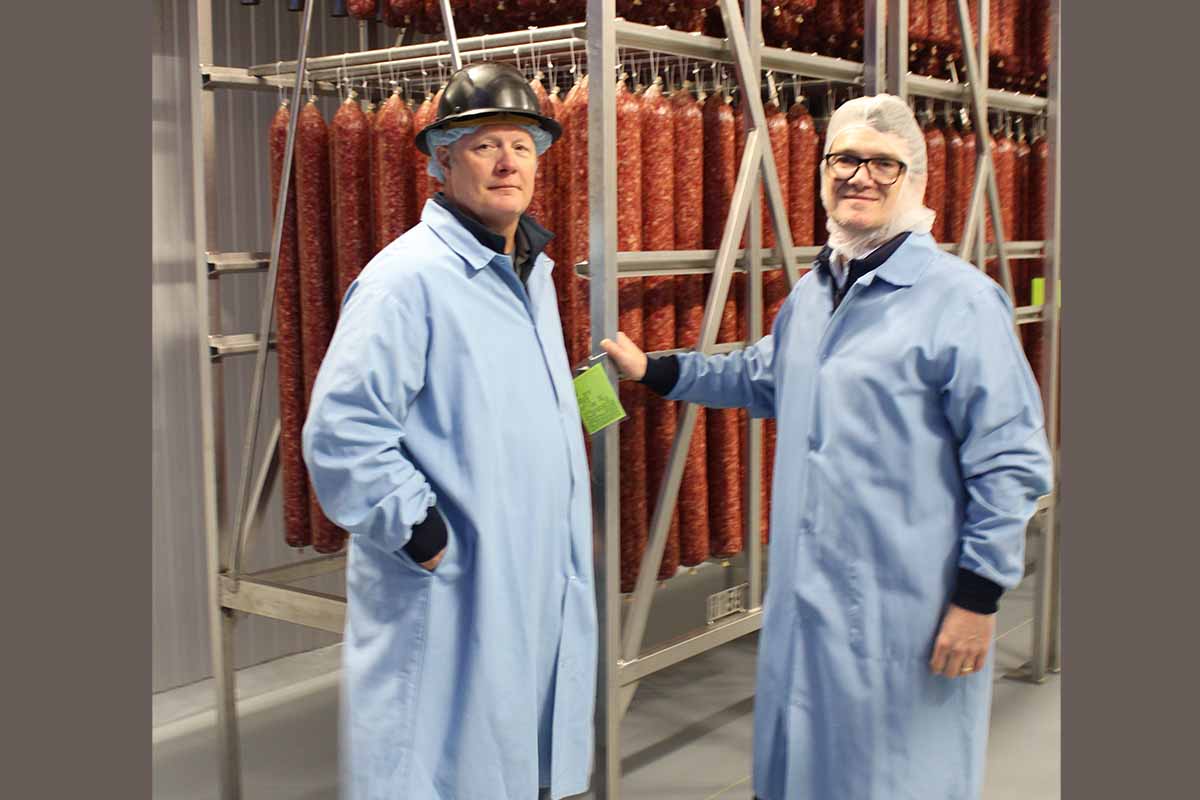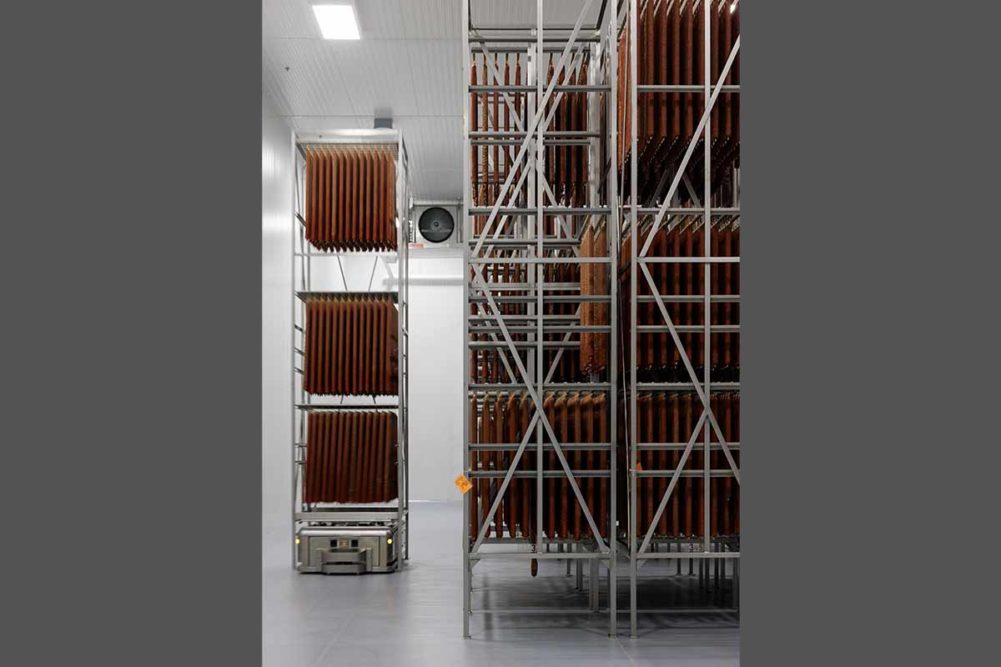Joe Machetta has been on the front row of growing the meat processing industry in central Missouri for the past three-plus years and his company is positively impacting the economies in the communities around Columbia, Mo. The head of operations with JBS Prepared Foods, a subsidiary of JBS USA, is no stranger to making the 35-mile commute between Moberly, Mo., where the company finished construction on a new pre-cooked bacon plant in 2021 and Columbia, just south of there. As that facility was ramping up, he was simultaneously leading the company’s next construction project, a new Italian meats plant, Principe Foods, in Columbia.
“We were starting up Moberly and shovels were in the ground here (in Columbia),” said Machetta, during a November exclusive tour of the 325,000-square-foot, $200 million facility, where operations began in April 2023. A seasoned industry veteran, Machetta joined JBS as part of the Plumrose acquisition from Danish Crown back in 2017.
Helping with the transition from bacon production to Old World premium meats, Machetta has worked alongside Vicente Zuffo, who joined JBS in 2007 and moved from Italy to the United States in 2016, when he was the lead for the company’s global procurement. His latest title at JBS is general manager of Principe Foods.
Zuffo brings a lifetime of experience producing Italian charcuterie and preserving its tradition in his roles with JBS. When JBS began to pursue opportunities to bring the production of Italian meats to the United States, Zuffo was a logical choice to lead the charge.
“Because of my background, the company invited me to lead this initiative here in the US,” he said.
The origins of Principe date back to 1945, when it was founded in Trieste. Principe is billed as Italy’s most prestigious line of authentic Italian salumi and the No. 1 producer of the coveted and strictly regulated Prosciutto di San Daniele. The company still operates one of the most efficient and modern food companies in Italy.
Principe Foods became a part of JBS in 2021, when the Brazilian meat giant acquired Grupo King’s, an Italian meats company that included Principe in a deal valued at about $92.5 million.
JBS acquired Plumrose USA in 2017 from Danish Crown A/S, and eventually rebranded that business to Swift Prepared Foods in 2021, which then transitioned to JBS Prepared Foods in 2023, and ultimately became the umbrella for Principe.
JBS Prepared Foods as a business unit has the capacity to produce up to 450 million lbs of finished products per year. It includes two plants in Council Bluffs, Iowa, as well as processing facilities in Manteca, Calif., Moberly, Mo., Swanton, Vt., Elkhart, Ind., Ottumwa, Iowa, Boonville, Miss., and now, Columbia, Mo. The US operations also include the JBS USA headquarters in Greeley, Colo.
Machetta said JBS has boldly invested in JBS Prepared Foods’ facilities and the communities where it operates during its evolution over the years.
“We’ve had a ton of investment in both Council Bluff plants, the Swanton plant, the Elkhart plant and Booneville as well; to really gain efficiencies in those facilities and making a lot of good upgrades in all of our facilities over the past six years,” he said.
The oldest plant in the portfolio is the Elkhart facility, which is over 100 years old and was formerly known as Elkhart County Packing Co. since 1923, and subsequently operated as Elcona Foods as of 1960, before it was acquired by Plumrose in 1976. It was one of three facilities under the Plumrose umbrella, along with Swanton and Booneville. Plumrose began operating its first plant in Council Bluffs after purchasing a facility from Tyson Foods in the late 1970s and built a second plant in the city in 2012.
Since building the Italian meat processing plant in Columbia, JBS has also remained true to its commitments to supporting its plants’ communities, including its Net Zero 2040 program; the Better Futures college tuition program and the JBS Hometown Strong investment plans, which has most recently included a $200,000 contribution toward building the 2.24-acre Whitegate Park in the city of Columbia.
Globally, JBS is the largest producer of beef and chicken and the second-largest producer of pork and lamb.
 Coin-cut pepperoni is sliced and packaged at Principe Foods' new plant in Columbia, Mo. (Source: Joel Crews/Sosland Publishing Company)
Coin-cut pepperoni is sliced and packaged at Principe Foods' new plant in Columbia, Mo. (Source: Joel Crews/Sosland Publishing Company)Opportunities knock
The investment in the Columbia plant’s 325,000-square-foot operation sits on approximately 80 acres with plans already underway to develop more of that land once the demand warrants it.
Initially built for an annual capacity of 30 million lbs, construction plans were designed to address needs well into the future, which is evident in the forward-thinking infrastructure and expansive spaces to accommodate its next level of capacity expectations to grow into the next phases.
“We spent a lot of time on this layout so that when we grow, disruptions will be minimal,” Machetta said, adding that Zuffo’s guidance and expertise in Italian meat production were integral in that process.
“The direction we have is to make this a long-term business,” Zuffo said.
The goal of the design was to duplicate the Italian traditions and practices used in Italy to produce dry-cured meats in a plant that is highly automated and brimming with cutting-edge technology.
“The concept of the process here is like it is in Italy,” Zuffo said, which means designating ample square footage in the plant for all the stages of fermenting sausage and prosciutto products while incorporating Old World techniques with today’s sophisticated equipment and systems.
Currently, about 170 employees work at the Columbia facility, with about 130 of those working in the processing area on a single-shift schedule. Once the plant achieves its first capacity goal, Zuffo expects to employ approximately 250 workers total, which is a relatively small workforce for what is expected to be 50 million lbs of production capacity, thanks to the efficiencies designed into the plant, its sophisticated equipment and automation throughout the spacious processing areas.
“We’ve got an immense amount of capacity,” Machetta said.
Building partnership
Jacksonville, Fla.-based design-build firm Stellar led the development and construction of the Columbia plant. Zuffo and Machetta worked alongside the Stellar team from the facility’s conception to completion.
“We selected Stellar based on their background in this category,” Machetta said of the firm’s experience developing and building food plants of similar scope and function. JBS also worked with The Austin Consulting Co., based in Cleveland, Ohio, which assisted in developing a location strategy and site selection, which ultimately identified Columbia as the ideal home for the facility.
He said the project started with a broad concept but that initially the goal was always to be prepared to ramp up production as demand for the specialty products grew.
“And we knew ultimately, all full, we wanted about 50 million lbs capacity,” Machetta said.
Zuffo pointed out that JBS/Swift operates similar operations in Italy, Brazil and Australia, which helped make some of the key decisions in developing the newest plant. Raw material processed in the Italian operations are sourced from specific breeds of pork that are produced in certain regions of northern Italy.
Raw material supply for Columbia is sourced from JBS pork producers in the United States.
The new plant is currently focused on the production of a variety of chub-packed logs and sliced products for retail and foodservice customers offering premium, Italian meats and taking advantage of the growing popularity of charcuterie-style eating.
Once underway, the construction project progressed quickly, but not without hiccups, many related to supply chain challenges including some delays in equipment delivery and construction supplies. Machetta and his team learned the value of flexibility with the goal of keeping the process moving and adapting when challenges arose, which he said was testament to Stellar’s approach to continue working regardless of hurdles.
“There were no big issues on site here, but it certainly caused us to dance around things,” he said. “We never stopped [construction], but we changed course a lot,” Machetta said.
Jim Oko, director of process development at Stellar, said overcoming hurdles is a part of most projects, and the Principe plant construction began in the face of challenges that included weather, the global pandemic and challenges related to accessing supplies. Teamwork and flexibility helped ensure the project was completed on schedule and within budget.
“We pride ourselves on our ability to overcome obstacles in the best ways possible,” Oko said, which included some outside-the-box solutions.
“This project was a full team effort, and we coordinated quickly to ensure JBS’ schedule was not held up by project challenges,” he said.
The plant is situated so processing operations progress from east to west, and is divided into three general areas: receiving raw ingredients and inspection/manufacturing. It also features a whole-muscle kitchen as well as a kitchen with automatic fat distribution capabilities; fermenting and drying rooms equipped with automated technology to maintain precise levels of humidity, temperature and airflow in designated rooms for prosciutto and salami products; and the ready-to-eat product part of the plant, which includes product peeling, slicing and packaging, including resources from Amcor Moda Packaging Solutions.
Oko said his team worked closely with Swift to ensure the flow of products at the plant was not disjointed, despite the complexity of producing the Italian meats.
“We designed this facility and its processes to be interconnected and flow seamlessly,” he said, and automation played a significant role in that. “We worked to make sure products move throughout the plant efficiently from manufacturing to packaging using strategic equipment layout and technology, including AGVs (auto-guided vehicles), gantry robots and conveyor belts.”
He added that to ensure inventory control, a “work-in-progress” step is used to buffer peeling, slicing and packaging steps.
Besides the six AGVs that are programmed to move products through multiple aging steps at precisely the right time, the plant features automatic and manual peeling and molding rooms to prepare the precisely aged prosciutto and fermented salami products. Next to the peeling and molding area is the high-speed slicing center, which is currently equipped with five lines, including slicing technology from Weber/Textor and Multivac/TVI. One line is dedicated to the trio packs that include three shingled varieties of sliced products and conveyors arrange flavor profiles into each package, such as a Genoa Salami, Sopresatta, coppa Italian Dry Salame, Calabrese, Pancetta and others. At the end of the packaging lines are the labelers, as well as all the configurations for multiple hole punches for packages destined to be hung on retail pegboards.
“Any packaging configuration you can imagine, we can do it in this facility,” Machetta said. “We can put the peg holes with zippers, without zippers, labels, no labels, printed, film, non-printed, whatever, you name it.”
There is ample capacity in the slicing area, where space is available for up to 10 lines as it too was designed for significant expansion as demand and capacity grow in addition to the packaging area. An on-site lab and R&D center are also an important part of the plant design as is the 27,000-square-foot “shell” that will eventually be utilized to accommodate the next area of growth.
“We’ve got an immense amount of capacity,” Machetta said
The shell was built with the infrastructure for a wide variety of processing applications. Machetta and Zuffo said the likelihood of transforming that space to process products for the snacking category is definitely on their radar.
From conception to startup, the project took about two-and-a-half years. Zuffo remembers, to the day, when ground was broken in May 2021 and then when the first machine was switched on.
“We ran the first salami here in December of ’22,” Zuffo said. “This was a good integration between our technical team, Stellar and the work done with the city regulators to get approvals. I’m proud of the job they did.”
He pointed out that planning for the project and investments in technology needed to be underway well over a year prior to breaking ground.
“We bought a lot of equipment even before the start of construction,” Zuffo said, knowing that it wasn’t uncommon to take delivery of a machine at least 26 weeks after confirming the order.
Lead times of six to eight months for some of the key technology used in the plant were normal during the project and the delivery timeframes haven’t improved much since then, according to Zuffo and Machetta.
 Joe Machetta (left) and Vicente Zuffo are proud of the partnerships that made the concept of a new Italian meats plant a reality in Columbia, Mo. (Source: Joel Crews/Sosland Publishing Company)
Joe Machetta (left) and Vicente Zuffo are proud of the partnerships that made the concept of a new Italian meats plant a reality in Columbia, Mo. (Source: Joel Crews/Sosland Publishing Company)Proven partnerships
When deciding on suppliers, Machetta said many companies submitted bids and multiple factors were considered when making the final decisions.
“It’s cost, it’s delivery and how much background and experience they have in dealing with these types of products; and flexibility plays a key role,” Machetta said. “This equipment has got to be flexible,” he said, “because there are so many different variations of the finished products.”
Italian roots
Principe offers products in three tiers, including: Principe’s Imports from Italy, Principe Domestic that are premium products produced in the United States like those made in Italy; and a line of Swift products, including salami and pepperoni produced in an American style. Zuffo said the three-tiered strategy is unique in the meat industry.
“The US market is really an extension of our business [in Italy] because all the supply is our pork meat, which is sourced from different regions in northern Italy for imported products,” he said.
Products produced at the new plant are designed to look, smell and taste like the premium, dry-cured and aged specialty meats that originated in Italy, using Old-World traditional techniques blended with modern processing technology. The Columbia operation is designed to produce coppa (seasoned pork from the CT butts that is stuffed in an artificial casing, dry cured and served in thin slices), speck (seasoned, smoked prosciutto), prosciutto, salami, pepperoni and pancetta (Italian bacon). The majority of the plant’s production is for salami and pepperoni, followed by prosciutto, coppa and pancetta. All of the products except for speck are currently processed at the plant and all the pork is sourced from the company’s vertically integrated suppply chain.
Zuffo said R&D development for speck is still being finalized, but the equipment needed to produce it is ready and waiting. He expects it to be in production by 2025.
Production of Principe’s salami and pepperoni products on a large scale at the new plant includes: one day of preparing the raw meat and spices; grinding the meat, blending it with the correct mix of spices and stuffing casings with the mixture before loading the products on racks; fermenting and drying for 12 to 56 days; peeling and packing bulk products, which requires about two days; and slicking and packaging non-bulk products. High-volume pepperoni production in the United States is the norm, and something Zuffo has grown to respect, especially given the high level of demand for the product as a pizza topping in the United States.
“The scale of production that is done in the US would be impossible to do in Italy; impossible in Brazil; impossible in Australia. Impossible,” Zuffo said.
Automating action
The six AGVs that traverse the plant transport multi-story tall racks of products from one aging and drying area to the next. They were supplied by Proxaut, an Italy-based subsidiary of Elgin, Ill.-based Middleby Corp. While the AGVs might get the most attention as an automation solution, Machetta demonstrated how simple solutions can also solve many problems even in a plant with production that is as sophisticated and diversified as Principe’s.
“This is a Torfresma box former; very simple. You just set the box on, fold in the bottom flaps and it puts the tape on, and it’ll convey up [to the overhead packing area of the plant],” Machetta said. “The box will be filled with pepperoni after it is sliced in [the plant’s] upper level. It comes back through; we close the top and we’re done.”
All of the air control for the entire plant, including the drying rooms, are installed in an interstitial area well above the ceiling of the processing area.
There are 28 drying rooms, 14 dedicated for prosciutto, each with a control system to maintain airflow, temperature and humidity and are monitored by engineers in a room teeming with monitoring technology designed to precisely move thousands of pounds of prosciutto and salami from one aging area to the next.
Two sizes of presses are used for prosciutto — they are formed in a warm state and then chilled. Depending on the product (white label, red label, blue label or black) prosciutto is aged either 14 months for the white label, 16 months for the red, 18 months for the black label or 20 months for blue, which is the most premium prosciutto.



